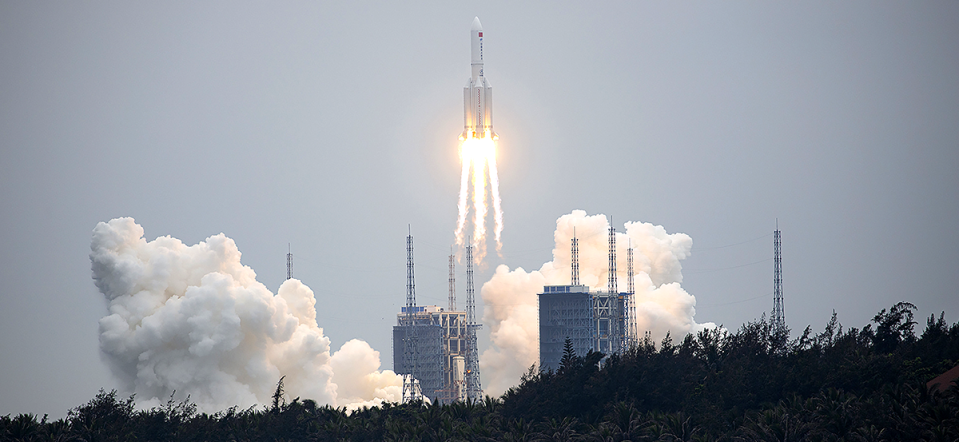'Really unpredictable': Chinese rocket hurtling back to Earth; possible debris zone spans huge swath of globe
A huge section of a Chinese Long March 5B rocket is falling back to Earth and debris may land sometime Saturday evening or later — if the rocket doesn't burn up on the way down.
The rocket could hit Earth around 11:30 p.m. EST Saturday, according to calculations by Aerospace Corporation, a California-based non-profit group that operates a space research and development center.
Where, exactly, remains a mystery — for now. As of Saturday morning, Aerospace Corporation's projections put a large swath of the U.S. near projected paths of the rocket after the predicted reentry time. A Saturday morning projection placed the rocket's predicted reentry over the Atlantic Ocean.
Another model by CelesTrak.com showed the rocket likely landing somewhere in the Indian Ocean.
"The core piece of this rocket is so massive and burns so long," ending up in a higher orbit, said Leroy Chiao, a former NASA astronaut and commander of the International Space Station in 2004-2005. "That’s what makes it really unpredictable where it’s going to come down."
U.S. officials are closely watching the rocket's trajectory. U.S. Secretary of Defense Lloyd Austin is "aware and he knows the space command is tracking, literally tracking this rocket debris," Pentagon spokesman John Kirby said.
China's government has said it expects most of the rocket to burn up during reentry.

Here's what you should know:
When and why did China launch the rocket?
The Long March 5B rocket carrying China's Tianhe space station core module lifted off from the Wenchang Space Launch Center in southern China's Hainan province April 29, 2021. Known as the Heavenly Harmony, the space station will be China's first to host astronauts long-term.
China plans 10 more launches to carry additional parts of the space station into orbit.
Is the Chinese rocket falling to Earth?
Yes, and “it’s potentially not good,” Jonathan McDowell, an astrophysicist at the Astrophysics Center at Harvard University, told the Guardian earlier this week.
Usually discarded core rockets, or first-stage rockets, plunge to the sea soon after liftoff and don’t go into orbit like this one did.
The rocket's sheer size also makes its reentry hard to predict, said Chiao, the former astronaut.
"You have this 22-ton piece of rocket debris and it's going to orbit the earth ... and it will come down wherever it's going to come down," Chiao said.
What is China saying about the rocket?
According to China, the rocket that's falling to Earth will mostly burn up on reentry, posing little threat to people and property on the ground, the nation's government reassured the world on Friday.
Speaking in Beijing, foreign ministry spokesman Wang Wenbin said China was closely following the rocket's reentry into the atmosphere, Reuters reported.
"The probability of this process causing harm on the ground is extremely low," he said.
China’s space agency has yet to say whether the main stage of the huge Long March 5B rocket is being controlled or will make an out-of-control descent.
Where will the Chinese rocket land?
No one knows for sure. McDowell told CNN that pinpointing where debris could be headed is almost impossible because of the speed the rocket is traveling – even slight changes in circumstance drastically change the trajectory.
The debris will be dragged toward Earth by increasing collisions with molecules in the Earth’s atmosphere, Space News said.
The debris' orbit covers a swath of the planet from New Zealand to Newfoundland.
"It's too soon to know exactly when the rocket body will reenter. But we do know it will be somewhere along that yellow and blue line," the organization said Saturday of its current predictions. "Current reentry point prediction is where the yellow satellite icon circled in orange is pinned. 🛰 = X marks the spot (for now)"
It's also too soon to know for sure where debris might land, but the organization suggested a debris track could be as long as 1,200 miles and 60 miles wide.
How big is the Chinese rocket that's falling to Earth?
It's roughly 100 feet long and and would be among the biggest pieces of space debris to fall to Earth.
"It's almost the body of the rocket, as I understand it, almost intact, coming down," Kirby said this week.
Has a rocket fallen to Earth before?
Yes. Last year, part of a Chinese rocket, one of the largest pieces of uncontrolled space debris ever, passed directly over Los Angeles and Central Park in New York City before landing in the Atlantic Ocean, CNN said.
The 18-ton rocket that fell last May was the heaviest debris to fall uncontrolled since the Soviet space station Salyut 7 in 1991.
China’s first space station, Tiangong-1, crashed into the Pacific Ocean in 2016 after Beijing confirmed it had lost control. In 2019, the space agency controlled the demolition of its second station, Tiangong-2, in the atmosphere.
Source: The Associated Press; maps4news.com/©HERE; USA TODAY research
This article originally appeared on USA TODAY: Chinese rocket Long March 5B hurtling back to Earth may hit Saturday

